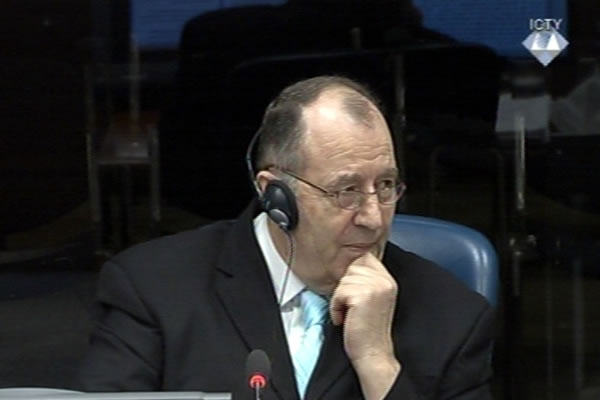Home
POLICE FIRST ARMED CRIMINALS THEN HAD TO FIGHT THEM
The prosecution challenged the claim made by Mico Stanisic, former Bosnian Serb police minister, that his ministry had to fight the paramilitary groups. Documents showed by the prosecution indicate that the police in fact handed out arms to criminals and deployed those criminals in combat. Karadzic, an avowed anti-communist, quoted Josip Broz in his defense
 Mico Stanisic, witness at the Radovan Karadzic trial
Mico Stanisic, witness at the Radovan Karadzic trial Former Bosnian Serb interior minister Mico Stanisic claimed that in 1992 his Interior Ministry (MUP) took a stand against the paramilitary units that were a menace to the non-Serbs. This prompted the prosecutor to contest the claim in the cross-examination with various police documents. When he was questioned by Karadzic, the witness drew a line between the Serb police and paramilitary forces. In Stanisic’s words, the two forces were bitter enemies.
One of the police departments reported on 3 August 1992 that the paramilitary units were causing problems but were also ‘helping the army and police in combat’. The witness used the fact that the last page of the report was missing to contest the authenticity of the document. ‘Any Tom, Dick or Harry could have written it’ just ‘to cause a furor’, Stanisic argued.
The prosecutor also had documents stating that the police armed the paramilitary groups. A receipt from a station in Pale notes that in the summer of 1992, weapons were issued to Vojin Vuckovic Zuca, leader of the notorious Yellow Wasps unit, which committed numerous crimes in the Zvornik area. The witness blamed it on Malko Koroman, the chief of the Pale police, who was removed from his post at a later date. The prosecutor showed that it was Stanisic who later promoted Koroman to a post in the ministry. After that, the prosecutor showed Stanisic’s authorization for a Heckler and Koch gun to be issued to Branislav Gavrilovic Brne, the leader of a paramilitary group in the Sarajevo region. The witness explained that the man, who held the rank of a Chetnik war leader, was probably tasked with some work for the police.
The prosecutor didn’t contest the claim that in the summer of 1992 the police did clamp down on some of the paramilitary units, but not because of their crimes against the non-Serbs but because they posed a risk for the Bosnian Serb authorities. In July 1992 members of the Yellow Wasps unit stopped the information minister Velibor Ostojic, beat him and forced him to eat grass. On another occasion, the Yellow Wasps stopped Minister Stanisic’s vehicle. The prosecutor also put it to Stanisic that by June 1992, if not before, he had known about the crimes committed by the paramilitaries in Zvornik. No one was arrested for the crimes until the incidents in July 1992. The witness replied that by June 1992 he had already demanded that the crimes be investigated and ‘to lay the groundwork for the arrests’.
Stanisic dismissed the suggestion that in his orders he had made demands that the crimes against Serbs be documented, doing nothing to investigate mass crimes against Muslims and Croats. Confronted with the claim that during his two tenures as the police minister, in 1992 and 1994, nothing was done to investigate the killing of about 200 persons at Koricanske Stijene, Stanisic shifted the blame on the judiciary and the military. As he explained, the crime was committed by military police officers, although all the indictments that pertain to this crime, including those issued by the Tribunal, identify the special police ‘intervention squad’ as the culprits.
Although he has been insisting since the beginning of the trial that he is a staunch anti-communist, in the re-examination Radovan Karadzic sought shelter behind Marxist platitudes in the laws of the former Yugoslavia. Karadzic put it to the witness that the defense of the Serb people in BH was carried out in line with the principles of the ‘all people’s defense and civil self-protection’, and the witness readily agreed. At one point, Karadzic even quoted from a speech made by Josip Broz Tito.
As the hearing drew to a close, the defense called Mihajlo Orlovic, a journalist from Sanski Most.
Linked Reports
- Case : Karadzic
- 2014-02-04 INVESTIGATION THAT COST WITNESS HIS JOB
- 2014-02-03 IF BOSNIAN SERB POLICE HAD BEEN PART OF INTERPOL…
- 2014-01-30 INCIDENT IN HAMBARINE – CAUSE OR PRETEXT FOR CRIMES?
- 2014-02-06 JOURNALIST RENOUNCES HIS WARTIME TEXTS
- 2014-02-06 CRIMES WERE COMMITTED BY POLICE OFFICERS AND ‘CONSCIENCELESS INDIVIDUALS’
- 2014-02-11 KARADZIC'S WITNESS BLAMES MILITARY FOR CRIMES IN FOCA PRISON
